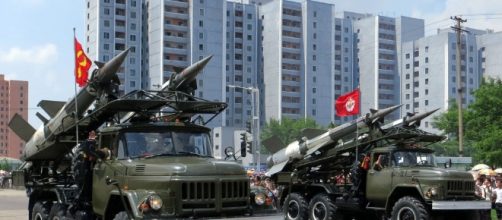The tension on the Korean peninsula continues to mount as news of a possible submarine missile test by North Korea reached the Pentagon. In response, the U.S. government urged China to monitor the possible missile launch and cooperate on pressuring the upstart rogue nation to stop.
What is the course of action of the U.S.?
Early on Thursday, People's Liberation Army (PLA) Vice Admiral Shen Jiniong and U.S. Admiral John Richardson, Chief of U.S. Naval Operations, talked through a video telephone conference about North Korea's aggressive militarization efforts.
This is after an intelligence report revealed "unusual deployment activity" of North Korean submarines in the East China Sea. Due to this unprecedented naval deployment, U.S. officials speculate that this might be preparations for North Korea's first attempt of firing a missile from a submarine.
The rapid succession of missile tests is a great cause for concern, especially after the July 4 missile test, which Pyongyang claimed to be an ICBM. The United States is growing weary over North Korea's continued disregard of diplomacy as it focuses on bragging about their recent advances in ballistic technology. According to military analysts, North Korea may have the ability to create a missile that can reach the U.S.
mainland in 2 years. This is possible especially if Pyongyang is allowed to freely continue its missile program.
It can be remembered that U.S. President Donald Trump had personally called on President Xi Jinping to increase its efforts to pressure North Korea into diplomacy. Though Trump concluded in a series of tweets that China's efforts to stop North Korea didn't work out.
What is the response of China?
Chinese Vice Admiral Li pointed out that U.S. request to monitor North Korean submarine deployment involves the use of China's navy. However, the relationship between the U.S. and China is not that solid, especially with the issue in Taiwan and the South China Sea.
According to Chinese surveys, most of the political analysts in Beijing believe that the U.S.
is focused only on its own interests and national security. Also, America's continued support on Taiwan proves that Chinese policy over the region is not being taken seriously by the White House. Aside from this, the tension over America's "Freedom of Navigation" operations in the South China Sea adds another bar of pressure on the tension meter in Asia.
In the end, America's hope of having China cage the unruly North Korea continues to be a futile dream. However, the Trump administration is not giving in to North Korea's aggressive stance and remains steadfast on its show of force policy and the continuous strengthening of anti-missile capabilities in the region.


